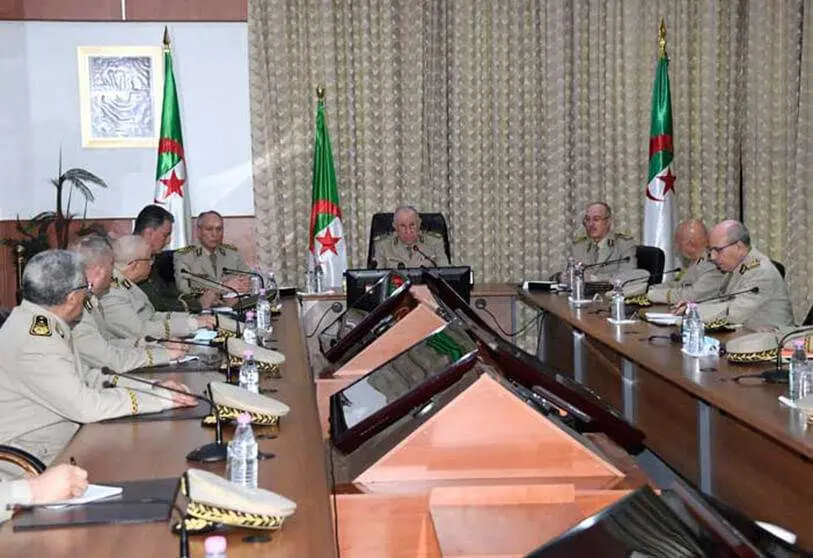Algeria swaps the head of espionage and counter-espionage, perpetuating instability in its intelligence service

The Algerian government has announced a change of roles between the different intelligence departments, maintaining the instability in its leadership. In a communiqué issued by the Ministry of Defence, Algiers announced that, by presidential decree, the directors of the Directorate General of Internal Security (DGSI) and the Directorate General of Documentation and External Security (DGDSE) will swap positions.
In a ceremony overseen by Chief of Staff Said Chengriha, General Yamal Kehal Meydub, until now in charge of external security, will become head of the DGSI, replacing Abdelghani Rachedi, who will take up his post as head of the spy service. Algiers has not commented on the reasons for this change at the highest level of the country's intelligence service, which joins a succession of dismissals, replacements and general instability in the ranks of the Algerian army and security service.

Meydub had barely been in charge of the North African Republic's espionage for two months when Algiers made his new posting official, while Rachedi had headed counter-espionage since 2020. This transience at the head of the country's top intelligence posts has become the norm, with up to seven different directors having succeeded each other since 2019 at the head of the DGDSE, to three at the DGSI, with several of them defenestrated and imprisoned, in a chain of purges and infighting.
The DGSI is considered the country's most important and powerful intelligence agency, especially in the current context of post-popular mobilisations and internal weakness and transition in the Algerian regime, in which counter-espionage is particularly valuable to Algiers.

Meydub, its new head, is an old hand in Algerian espionage. Trained in French and Russian intelligence schools, he made a career as an agent in several Algerian diplomatic missions, in countries such as Iran, Syria, Lebanon, Yemen and France, until he was put in charge of the personal security of former president Abdulaziz Bouteflika in 2004. After 11 years as Bouteflika's "guardian angel", he fell from grace in 2015 after several shots were fired at the president's residence in the city of Zeralda, and was sentenced to 3 years in prison for "negligence". Meydub eventually managed to escape conviction, but he was left out of public life, having fallen out of favour with the former president's circle.
After seven years in the wilderness, the agent made a triumphant return from the hells of ostracism, being appointed by President Abdelmadjid Tebboune as the country's spy chief. Two months after his rehabilitation, Meydub will now occupy what is arguably the Arab nation's most important intelligence post, Algiers' latest gamble to bring some stability to its spy service.

The chaos in Algerian intelligence began in 2015. Then, Bouteflika purged the man who had been head of the then Department of Intelligence and Security (DRS) for more than two decades, the mysterious General Mohamed Mediene, also known as Tufik, a character worthy of a John Le Carré novel dubbed 'the God of Algeria' for his immense power in the shadows of the regime.
His defenestration responded to a wave of purges interpreted by experts as a power struggle between the old ex-president's inner circle, led by his brother Said, and the powerful DRS. Bouteflika won the battle, and the intelligence service, previously considered a 'state within a state', came under the firm control of the president, who placed General Bashir Tartag at the helm.

A year later, the Algerian government dissolved the DRS outright, replacing it with the current organisation chart, in which a Defence Ministry body known as the Coordination of Security Services (CSS) is responsible for the administration of three separate directorates: the DGSI, in charge of espionage abroad; the DGDSE, in charge of counterintelligence; and an electronic security department.
In 2019, the popular movement against the country's leadership, known as the 'Algerian Hirak', turned the intelligence service upside down again. The then chief of staff, Ahmed Gaid Salah, a strongman after the fall of Bouteflika, defenestrated Tartag, who has since been imprisoned, and placed the country's intelligence under the firm control of the army.
Since then, there has been a shuffling of names at the head of the various bodies and directorates, accompanied by purges and arrests, generating a chronic instability that is highly detrimental to an intelligence agency where stability and the emergence of a working culture of its own is vital for its proper functioning.









